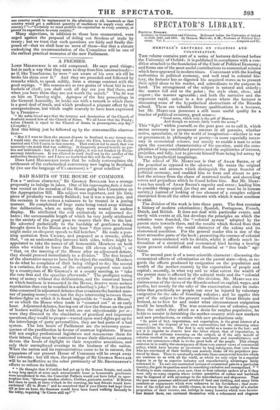BAD HABITS OF THE HOUSE OF COMMONS. Fos a "
serious character," Sir GEORGE SINCLAIR has a strange propensity to indulge in jokes. One of his impromptus faits a laisir was vented on the occasion of the House going into Committee on the Appropriation Bill. His subject was important, and his little piece of jocularity was neatly finished ; but it was a mere jest, and the occasion is too serious a nuisance to be treated in a jesting manner. He complained of large sums being voted away without due deliberation, when so many days were wasted in useless display. He attributed the evil exclusively to adjourned de- bates ; the unreasonable length of which he very justly attributed to the anxiety of the great guns to reserve their fire to the last. He adverted pathetically to the hardship of gentlemen being brought down to the House at a late hour " that some gentleman might make an eloquent speech to full benches." He made a pun- ning quotation from CICERO, and proposed as a remedy, either that, " on an understanding between both sides, tellers might be appointed to take the names of all honourable Members on both sides who wished to leave the House till eleven o'clock "; or "that, on the meeting of the House after an adjourned debate, they should proceed immediately to a division." The first branch of the alternative seems to have for its object the enabling Members to do what he complains of their being obliged to do ; the second is a variation, for the worse, of the sarcastic proposal once made by a countryman of Sir GEORGE'S at a county meeting, to " take the vote first and the speeches afterwards." The profligate voting away of money without due deliberation, and the unnatural hours at which business is transacted in the House, deserve more serious reprobation than can be couched in a schoolboy's joke.* It is not the time consumed in adjourned debates that occasions the hurried man- ner of passing money-votes, but the days intervening between those faction-fights on which it is found impossible to " make a House," or on which the House when made is "counted out" at an early hour. Adjourned debates, leaving out of view the finesse on the part of leaders waiting for the last word, are not objectionable per se : were they directed to the elucidation of practical and important questions, they would be proper—wasted upon word-fights got up for the interchange of party personalities, they are bad parts of a bad system. The late hours of Parliament are the necessary conse- quence of the predilection in favour of amateur legislators. If men will not employ professional legislators and remunerate them for their labour, they must be contented to see their dilettanti senators devote the hours of daylight to their respective avocations, and only their unemployed evenings to the business of the nation. When the nation and its representatives come to be in earnest, the puppyisms of our present House of Commons will be swept away like cobwebs : but till then, the persiflage of Sir GEORGE SINCLAIR will be as ineffective as the sober pertinacity of Mr. BROTHERTON'S efforts to reform its habits.
" He thought that if Catiline had got up in the Roman Senate, and made a very long speech at some such unseasonable hour as honourable gentlemen were accustomed to rise, the Conscript Fathers would not have failed to apos- trophize him, Qiwusque tandem abutere, Catilina, patieatia nostra.' If Brutus bad risen to speak at three o'clock in the morning, his best friends would have exclaimed 'Et to Brute I' and he conceived that if ever Cicero had kept them till so late an hour, the Senators would have been found walking listlessly in the lobby, inquiring ' Is Cicero still up?' "


























 Previous page
Previous page